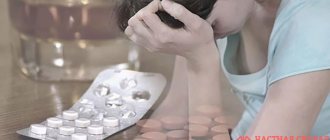Read in the article:
- What is alcoholic psychosis
- How does alcohol psychosis manifest?
- How long does alcohol psychosis last?
- First aid for alcoholic psychosis
- Consequences of alcoholic psychosis
- Treatment of alcoholic psychosis
The article was prepared by expert
Chekmarev Maxim Sergeevich
Psychotherapist, psychiatrist, psychiatrist-narcologist
Alcoholic psychosis is a severe mental disorder that occurs as a result of prolonged drinking bouts. In the worst case, the disease can cause death. Therefore, alcoholic psychosis requires urgent hospitalization and treatment in a hospital.
What is alcohol psychosis?
This is a pathology that develops due to uncontrolled consumption of alcoholic beverages in large quantities. Therefore, people with the second and third stages of alcoholism, who rarely break out of binge drinking and have a high tolerance to ethanol, are at risk. Research by scientists has confirmed that psychosis develops due to metabolic disorders. Alcohol washes vitamins C and B from the blood, as well as chlorine and sodium. Therefore, changes occur in the functioning of the brain against the background of an imbalance between adrenaline and adrenochrome. This causes a sharp change in the psycho-emotional state even after giving up drinking.
There is a version that psychosis is not directly related to metabolic disorders. It appears due to an altered state of consciousness that occurs during intoxication. Therefore, the development of pathology is influenced by a person’s temperament. If a person has a calm and non-conflict character, then the likelihood of developing pathology is lower. If he is quite aggressive and easily loses his temper over any little thing, then alcohol will only worsen the situation.
Scientists are confident that the immune system affects the state of the psyche. With a weakened immune system and depressed nervous system, the likelihood of psychosis increases significantly.
How does alcohol psychosis manifest?
With regular consumption of alcohol, ethanol breakdown products accumulate in the blood. They have a pronounced neurotoxic effect, so there is a destructive effect on brain cells. Gradually, the alcoholic develops psychoses of various types: delirium, hallucinosis, paranoid, delusional psychosis, etc.
Delirium is better known as delirium tremens. Appears after giving up drinking after binge drinking for 72 hours. The following symptoms are noted:
- Tremor.
- Increase in body temperature.
- Increased blood pressure.
- Disorientation.
- Hallucinations.
- Sweating.
- Unstable mood.
Hallucinosis occurs mainly in people over 50 years of age. The main symptoms are observed during withdrawal symptoms. A person begins to hear voices and see entities in the process of falling asleep. Basically, hallucinations have a commanding tone and insult the person for drinking. Then the condition worsens and the following symptoms appear at any time of the day:
- Panic fear.
- Tactile, visual, auditory hallucinations.
- Anxiety.
- Deep depression.
In its acute form, this type of psychosis goes away on its own. In the chronic form, treatment in a hospital is required, because the functioning of consciousness is disrupted, intellectual abilities decrease, and the realism of hallucinations increases. If left untreated, the serious condition may persist for 10-12 months.
Alcoholic paranoid is a type of acute psychosis, which is accompanied by fear and anxiety. Appears both during binge drinking and after giving up drinking during withdrawal symptoms. The alcoholic begins to think that he is the only sane and honest person on this earth. Therefore, he can make trouble with people around him, attack family members, and show obvious aggression. This psychosis leads to antisocial behavior and is difficult to treat for a simple reason - the person is 100% sure that the attempt to place him in a hospital is a conspiracy.
Delusional psychosis is accompanied by inadequate reactions to current events. Feelings of jealousy, persecution, and self-blame intensify. At the same time, the psychological state is unstable, because the person experiences fear and anxiety and behaves impulsively. This condition can last from a day to several weeks.
Types of disorders
According to the nature of the course, alcoholic psychoses are divided into 3 forms:
- acute (up to 70% of diagnosed cases);
- subacute (more often in the form of paranoid);
- chronic.
Please note: If problems in the mental sphere once made themselves felt, then in the future the probability of relapse is quite high. For many chronic alcoholics who have never sought medical help, repeated exacerbations become the norm.
The following types of mental disorders arise against the background of strong drink abuse:
- delirium (“delirium tremens”);
- delusional psychoses (paranoid);
- hallucinosis;
- pathological intoxication;
- encephalopathy.
Symptoms of delirium
Delirium most often develops on the 3-5th day of withdrawal after a long binge. The risk of delirium tremens increases many times when using surrogates. In this condition, the patient experiences an aversion to alcohol and suffers from sudden mood swings. In the early stages, visions integrated into reality appear, and as it progresses, true hallucinations (visual, auditory and tactile) appear.
Patients suffer from insomnia, and short-term sleep is accompanied by nightmares. In the morning there are light intervals, but by night the symptoms increase. A pronounced tremor of the limbs, a febrile reaction with a rise in temperature, arterial hypertension, confusion, and complete disorientation in space and time are recorded. Brain edema, which poses a real threat to life, cannot be ruled out.
Treatment of this alcoholic psychosis is carried out in a specialized hospital department. In most cases, the condition returns to normal within 3-7 days.
Symptoms of delusional psychosis
Alcoholic paranoid is the most commonly diagnosed delusional psychosis. People suffering from alcohol addiction begin to feel that they are being persecuted and want to cause harm, so they experience an unaccountable, panicky fear (especially in the evening and at night). In some cases, illusions or true hallucinations appear in parallel.
Acute paranoid torments the patient from 3-4 days to 2-3 weeks, and prolonged paranoid – up to several months. For men over 40 years of age with a long alcoholic “experience,” delusions of jealousy are very typical. One of the frequent manifestations of this pathology is aggression towards a spouse and an imaginary rival.
Signs of alcoholic psychosis with hallucinations
In hallucinosis, the leading symptom is images that appear in the patient’s mind without external visual, auditory and other stimuli. The patient “hears” strange noises and voices. He experiences anxiety and fear, and suffers from sleep disturbances. Disorientation, as a rule, is not observed. There are frequent cases of suicidal or delusional ideas. The acute form occurs during abstinence or at the height of binge drinking.
Hallucinations last from 3 days to 1 week. Prolonged hallucinosis is characterized by the addition of delusions of relationships or persecution, as well as depression. Pronounced mental changes persist from 3-4 to 6 months, less often – up to 1 year. A typical manifestation of the chronic condition is auditory hallucinations that occur daily. An alcoholic may hear imaginary dialogues or advice, but usually takes this calmly and generally remains adequacy. Improvement occurs only after a year or more.
Symptoms of pathological intoxication
Pathological intoxication is an inadequate reaction to relatively small doses of ethanol. Severe mental disorders often appear after a bottle of beer. The paranoid form of the disorder is characterized by an inadequate perception of reality, delusional experiences and ideas, and, as a result, strange actions.
Psychomotor agitation, disorientation in time and space, unmotivated anxieties and fears, anger and suspicion are very typical for epileptoid pathological intoxication. In a twilight state of consciousness, a person is capable of committing a crime. With such alcoholic psychoses, the prognosis is quite favorable.
Signs of encephalopathy
Encephalopathies that occur during prolonged alcohol intoxication include Korsakov's psychosis, Guy-Wernicke encephalopathy and alcoholic pseudoparalysis.
Korsakoff's psychosis often develops after severe delirium; the likelihood increases with the consumption of surrogates (alcohol-containing perfumes, technical fluids, etc.). It is characterized by serious disturbances in memory and orientation in space and time. The mood changes sharply from causeless euphoria to deep apathy.
With Guy-Wernicke encephalopathy (hemorrhagic polyencephalitis), a number of reflexes are affected (including respiratory and swallowing), convulsions and arterial hypotension develop. In the absence of medical care, patients often die.
Pseudoparalysis is accompanied by amnesia, loss of skills, personality degradation and progressive dementia. If treatment is not started immediately, a vegetative state develops.
How long does alcohol psychosis last?
- Alcoholic delirium – occurs in acute form for a maximum of 10 days.
- Alcoholic hallucinosis – lasts from 72 hours to a month, depending on the form.
- Alcoholic paranoid – maximum duration up to 14 days.
- Alcoholic delusional psychosis - without work with a psychiatrist, can persist for several months.
Ethanol has a neurotoxic effect on brain cells, the consequences of which can be irreversible, so treatment cannot be delayed.
First aid for alcoholic psychosis
At the first symptoms of pathology, you can call the drug treatment team at the AlkoZdrav help center. Within 60 minutes, specialists will come to your home and select a paid clinic to relieve a mental disorder. This way you will maintain 100% anonymity of your treatment. If an acute form of alcoholic psychosis is observed, treatment will be required in the psychiatric department of the hospital.
Fact: Mental health symptoms do not go away on their own. Often family members bet that the pathology will disappear after a healthy sleep. This is a misconception, because there is a possibility of death with such a huge load on the body. In addition, hospitalization helps protect family members from the alcoholic. During psychosis, he behaves unpredictably and aggressively, and can cause serious harm to loved ones because he does not control his behavior.
The main thing is not to put pressure on the alcoholic if you notice inappropriate behavior. If he has auditory or visual hallucinations, there is no need to argue with him or, on the contrary, laugh at his inappropriate behavior. Politely ask him to go to bed, drink water, take a sedative. After this, calmly wait for the doctor to arrive. If you anger a person in a state of psychosis, he can cause irreparable damage to the health of himself and the people around him. During delirium tremens, people demonstrate enormous physical strength, which is unusual for them in an adequate state.
Treatment at home: effectiveness
It is very difficult to talk about the effectiveness of treating alcoholic psychosis at home.
Firstly, we do not see the patient himself, and a description of symptoms over the phone is not a guarantee of choosing a quality treatment method. When relatives dial the clinic number in desperation and a specialist comes to the house, this does not mean that the treatment will be completed at home. If these are only the first warning signs of alcoholic psychosis, then our doctor will simply relieve the symptoms and offer to undergo examination or further treatment in a private clinic.
Useful links at the first signs: how we can help you - read or contact the hotline specialists
Alcohol poisoning /events/alkogolnoe-otravlenie-chto-delat-i-kak-lechit/ Alcohol tremor /events/alkogolnyy-tremor-s-pokhmelya-i-posle-zapoya-metody-lecheniya/ An alcoholic suffers from a hangover /events/lomka -alkogolika-kak-snyat-simptomy/ Quick sobering up /events/protrezvet-na-domu-ili-v-klinike/ Break free from alcohol addiction /events/prokapatsya-ot-alkogolya-v-moskve/
First aid for alcoholic psychosis is possible at home, but we ask you to treat your loved one’s illness with the utmost seriousness and responsibility. We cannot guarantee a quick cure at home, and the above links refer specifically to first aid, but do not constitute a comprehensive and complete treatment.
Take what is written this way: we will begin treatment for alcoholic psychosis at home and will offer all available treatment options based on your individual wishes and the patient’s physical condition.
Alcoholic having a nervous breakdown? Not a reason to panic, but a reason to worry!!! Call at the first sign, we will help!!!
How alcoholic psychosis develops: prevention and timely treatment
There are many types of alcoholic psychosis and, accordingly, many ways to treat it, but as you know, it is better to prevent than to treat.
Systematic consumption of alcohol leads to psychosis; the body is gradually poisoned, and with it all the internal organs, and most importantly the brain. The main organs that are responsible for the process of eliminating toxic substances are poisoned and begin to function ineffectively. Harmful substances remain in the body and the body gets used to it - it is at these stages that the first symptoms begin. At the initial stages, you can put on an IV and stop the binge. Then accompanying factors come into play, namely what causes stress even in a normal person. An alcoholic has a hard time coping with these things, and he begins to escape reality more and more with the help of alcohol. And after a while we have severe nervous breakdowns and alcoholic psychoses.
If at the initial stages help can be quick and effective, then working with the investigation is much more difficult. Psychologists and residential organizations are involved in the prevention of mental disorders. There is no need to be shy and delay treatment, all this is anonymous, and no one will know about the presence of a problem, you can safely ask for help.
It is important to know!!! If a person is accustomed to such a rhythm of life, and the body is already working hard, then a sharp reduction in the dose of alcohol can provoke “delirium tremens.”
Delirium tremens in alcoholism - toxic substances in the body have become part of the life of an alcoholic, the body has become accustomed to them and this rhythm. Abrupt refusal of alcohol provokes drastic changes and leads to what is called: delirium tremens. The procedure for eliminating binge drinking should be carried out strictly under the supervision of specialists.
Prevention of nervous breakdowns in alcoholics
Consequences of alcoholic psychosis
The craving for alcohol is associated with the desire to achieve a feeling of euphoria and liberation. Gradually, due to the increase in tolerance, the pleasure from drinking decreases, and physical and psychological dependence reaches a maximum. In this case, blood sugar levels drop, metabolism is disrupted due to the leaching of minerals and vitamins, and toxins accumulate in brain cells. Often this becomes the cause of psychosis and a sharp change in psycho-emotional state. Even after treatment, alcoholic encephalopathy persists, in which mental disorders are combined with neurological ones.
Therefore, after eliminating acute symptoms, repeated exacerbation is possible in the spring or summer season. This often occurs in alcoholics at stages 2-3 of addiction. Even after therapy, pathological intoxication may appear, which quickly sets in after drinking alcohol in minimal quantities. This pathology is accompanied by an increase in motor activity and aggression.
If a person recovers from delirium tremens on his own without medical assistance, then an exacerbation may occur in the future. From a minimal amount of alcohol, he will begin to delirium, visual and auditory hallucinations, darkness in the eyes, and inappropriate behavior will appear. “Squirrel” is accompanied by a desire to run away or hide from everyone.
The main thing is to contact the clinic in a timely manner to begin comprehensive treatment in a hospital. The sooner you start treatment under strict medical supervision, the higher the chances of cure. In any case, you will have to completely give up alcoholic drinks forever.
In large quantities, ethanol causes irreparable damage to brain cells. Therefore, over time, concentration, attention, and intelligence decrease. Memory and logical thinking deteriorate. An unstable psycho-emotional state can last a lifetime if you do not give up drinking in time and normalize brain function.
Symptoms
The clinic develops during periods of increased alcohol consumption (binge drinking). No less often, signs of alcohol abuse appear a few days after the patient stops abusing. Men aged about 40 years are more susceptible to violations. A high rate of progression of phenomena is observed in people who initially have excitable-unstable character traits.
Delirium
Delirium (aka “delirium tremens”) is a clinical variant of the most common metal-alcohol psychosis, which has the following symptoms:
- early signs (precursors): restlessness, restlessness, anxiety, nightmares, fearfulness, depression, pale skin, moderate increase in body temperature, sweating, rapid pulse, arterial hypertension, trembling limbs, muscle weakness, impaired coordination of movements;
- hallucinatory stupefaction;
- visual hallucinations, illusions, and scene-like fantasies predominate;
- rave;
- emotional variability;
- fear;
- motor hyperexcitability – agitation;
- disturbance of orientation in time and place;
- speech is abrupt, incoherent;
- attention is over-distracted;
- awareness of one's own personality is maintained;
- behavior corresponds to the content and emotional coloring of hallucinations;
- Without treatment, it goes away in 3-5 days (can last up to 7-10 days), but the patient poses a threat to himself and others.
The first episodes of delirious stupor usually develop no earlier than 7-10 years after the existence of the dependence syndrome. Symptoms typically manifest on days 2-4 of abstinence (“withdrawal”), in the evening or at night. Characteristic is the temporary disappearance of hallucinatory delusions - “light intervals”.
Get help now
Do any of your relatives or friends have an addiction? Have you tried in every possible way to help, but as a result the person still returned to his past life?
You are not the first to encounter this problem, and we can help you.
We guarantee anonymity, we will persuade you to undergo treatment, and we will help you choose a center.
Call us
+7
or
Call me
Encephalopathy
Encephalopathy clinically reflects damage to brain tissue. Develops at stages 2-3 of addiction. The following forms are distinguished:
- Acute and chronic, but there is no sharp transition between them
- Gaie-Wernicke is a gradually onset encephalopathy with a duration of 2-3 months, often as a result of delirium or in somatically weakened dependent patients with many concomitant diseases. The psychotic status is combined with the following symptoms: polyneuropathy, urinary/fecal incontinence, muscle hypertonicity, photophobia, arrhythmias, fever, stunned state, coma. Without treatment there is a high risk of death!
- Korsakov's psychosis - memory impairment is added. Patients are lethargic, uninterested in their surroundings, speech and attention are apathetic. Reduced or absent memory of current events. Retrograde amnesia and memory replacements are prominent.
- Pseudoparalysis: personality degradation, severe dementia, loss of professional skills/knowledge, severe amnesia, pathological judgment. The mood is carefree, ideas of greatness are possible. There is no awareness of the disease and its consequences (anosognosia). It is difficult to treat and progresses steadily.
In encephalopathies, hallucinatory-delusional syndrome is combined with signs of severe degeneration of the central nervous system (CNS). They often occur chronically with periods of exacerbation in the spring and summer. Such patients need to receive combination therapy.
Delusional form
Domestic researchers identify the following types of delusional psychosis:
- Delusions of jealousy (3% of all alcohol psychoses). Men after 40 years of age are more likely to develop marital paranoia. Pathologically, ideas are layered and reinforced by illusions. Patients often spy on their partners, start unreasonable quarrels, even leading to violent criminal behavior.
- Acute and prolonged alcoholic paranoid (delusions of persecution). Being in a darkened consciousness, patients are sure that they want to rob or cripple them. Any words or gestures of others seem suspicious. This causes impulsive behavior: the addict suddenly runs away, jumps out of a moving car, and calls the police.
The incidence of this clinical variant is 4.7%-9.5%. The majority of patients are men. Clinical manifestations are varied and depend on personal and social characteristics.
Delusional ideas are extremely ridiculous and focused on everyday topics. Pathological confidence in the wife's infidelity or her disrespectful behavior leads to rudeness, often to sexual violence. The range of interests is limited to being in one’s own delusions.
Hallucinosis
With prolonged abuse of alcoholic beverages (more than 10-14 years), complications may also arise with a predominance of only a psychotic clinic. There are such clinical forms of hallucinosis:
- Acute (3 days – 1 month). Occurs at the height of binge drinking or in the structure of a hangover syndrome. The disorders are dominated by extensive auditory hallucinations of an accusatory nature, accompanied by delusions of persecution. Fictional voices may scream or fade to a whisper. Often such a “choir” teases, insults or mocks the patient.
- Subacute or prolonged (1-6 months). The clinical picture is similar to the acute course, but with the addition of depression or delirium. In this case, the behavior is more orderly. Addicts are relatively calm about hallucinosis.
- Chronic (6 months - years) with or without delirium. “Voices” become part of a person’s daily life. The content of illusions corresponds to the content of hallucinations, with which addicts quickly find a common language.
Despite the lack of criticism of one’s condition, a clear awareness of what is happening remains. Patients are correctly oriented in time and place, but their behavior is confused or confused. Hallucinosis responds quite well to treatment.
Pathological intoxication
Somewhat less frequently, psychotic disorders occur directly at the peak of alcohol intake, usually in large doses. This form of darkened consciousness is called pathological intoxication with the following symptoms:
- a sharp distortion of perception;
- delusional ideas;
- fear;
- anxiety;
- anger;
- rage;
- motor excitement;
- aggression towards others;
- disorientation;
- sometimes, in a fit of delirium, a person retains the ability to perform complex actions, for example, driving a car;
- the conversation is incoherent, often about one’s own experiences;
- ends as abruptly as it began;
- symptoms often progress to deep sleep;
- after awakening, amnesia is observed, memories of what happened are vague.
When motor excitation acquires pathological features, they speak of an epileptoid form of intoxication. When disorders of consciousness predominate, they speak of the hallucinatory-paranoid variant. The behavior of patients is aggressive and often reflects distorted perceptions.
The study of the biopsychosocial characteristics of patients with alcoholic psychoses showed that these are much more likely than others: hereditary burden of alcoholism, previous traumatic brain injuries of varying frequency and severity, viral hepatitis, hypoprotective upbringing, contradictory upbringing and overprotection, as well as pathological character traits, reaching a degree of pronounced accentuation and psychopathy. Among the latter, the most common were persons with unstable (46.9%) and asthenic (23.7%) character traits. In patients with hysterical-excitable and excitable-unstable character traits, a high rate of progression of the disease was significantly more often observed.
Uvarov I. A., Lekomtsev V. T. Biopsychosocial risk factors for the development of alcoholic psychoses // Bulletin of psychiatry and psychology of Chuvashia. 2009. No. 5.
Rare types
Metal-alcohol psychoses can have such diverse manifestations that the following rare forms of conditions are distinguished:
- With a picture of pellagra due to deficiency of vitamin PP (nicotinic acid). Combined with inflammatory lesions of the skin and gastrointestinal tract.
- Atypical acute hallucinosis with oneiroid. Patients note the realism of fantasies of epic content: world cataclysms, UFOs, intergalactic wars, divine intervention.
- With symptoms of metabolic polyneuropathy (beriberi) due to deficiency of vitamin B1 (thiamine) - asthenia, pain or discomfort in the extremities, sudden sweating.
- With symptoms of retrobulbar alcoholic amblyopia - visual impairment, including perception of the color spectrum, combined with paralysis.
- Atypical deliriums: hypnagogic, lucid, abortive.
- Encephalopathy associated with stenosis of the superior vena cava, which is typical in the presence of liver cirrhosis. In mild cases, it manifests itself as hand tremors, silly euphoria or irritability. Acute confusion leads to coma and death.
- Cerebellar atrophy caused by the toxic effects of ethanol. Psychoses are accompanied by progressive neurological disorders: muscle weakness, hypotension, problems with balance, inability to maintain a posture or perform complex actions.
- Marchiafava-Bianmi encephalopathy due to damage to the corpus callosum. Corresponds to slowly developing degradation.
- Central necrosis of the pons of the brain - apathetic stupor, decreased response to stimuli, ocular symptoms, paresis, paralysis.
- Transient dementia.
- Mixed types.
Due to the variety of clinical signs, psychotic complications occupy different positions in international classifiers. According to ICD-10 they are coded as F10.5x and F10.75, ICD-11 - 6C40.6. Often one patient has several related diagnoses, not counting general somatic ones.
The incidence of alcoholic hallucinosis practically does not depend on the length of alcoholism. Alcoholic delusions of jealousy and Korsakov's psychosis are observed with a history of alcoholism of more than 30 years. The likelihood of occurrence depends on the quality of the drinks consumed. It is minimal with the abuse of low-alcohol drinks and maximum with the abuse of strong alcoholic drinks. Alcoholic psychoses with abuse of alcohol substitutes have the most severe course. Alcoholic psychoses associated with the use of other psychoactive substances develop at a younger age and have a less favorable prognosis.
Egorov A. Yu., Aleksin D. S., Petrova N. N. Features of alcoholic psychoses in a psychiatric clinic // Bulletin of St. Petersburg State University. Episode 11. Medicine. 2012. No. 1.
Treatment of alcoholic psychosis
If pathology develops, you need to call an ambulance to eliminate the acute form of psychosis. This is usually done in a hospital psychiatric ward. If alcoholic delirium, paranoid or hallucinosis does not occur in an acute form, then you can call the drug treatment team at the AlkoZdrav help center. At the beginning of therapy, detoxification is carried out. Under a drip, it is possible to quickly remove accumulated toxic substances from all tissues. Additionally, substances are introduced that protect brain and liver cells from destruction, strengthen the immune system, and replenish the deficiency of vitamins and minerals.
After normalization of brain function and elimination of symptoms of alcoholic psychosis, a motivational conversation is held with a narcologist. Only with 100% abstinence from drinking and, if desired, starting therapy can a positive result be achieved. In severe conditions, negative effects persist after brain cells are destroyed, but it is hoped that mental alertness, concentration, attention and memory will be restored during treatment.
The duration of inpatient therapy is 8-12 months, depending on the patient’s health condition. Medical and social rehabilitation helps you find like-minded people, get support from loved ones, believe in yourself, integrate into society and start a new life. It includes drug therapy. The patient is prescribed tranquilizers, nootropics, antidepressants. They help normalize sleep, get rid of withdrawal symptoms and relieve general stress. During individual work with a psychologist, the root cause that caused the person to start drinking alcohol is eliminated. Group classes help you get rid of fears and complexes, adapt to society, and set goals in life.
After completing the rehabilitation program, the next stage is the period of social adaptation, during which the patient can restore lost skills and abilities. The center’s specialists help a person decide on subsequent training and employment, which increases the effectiveness of complex treatment and maintains motivation for a sober lifestyle.
To anonymously consult and schedule an in-person consultation, call us at 8 (800) 775-32-63.








